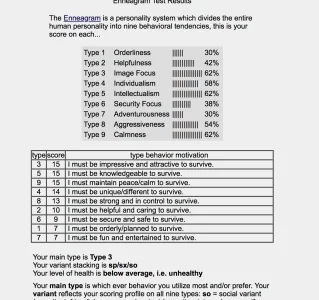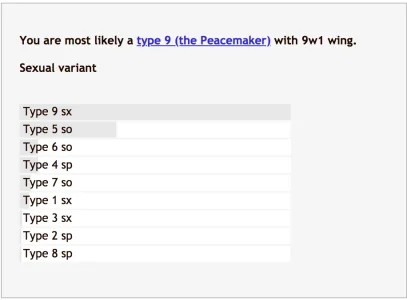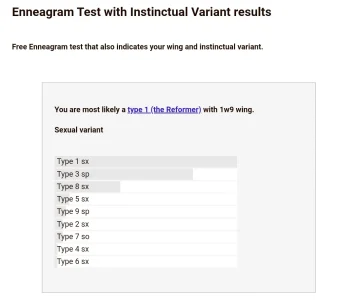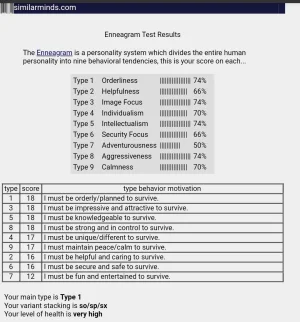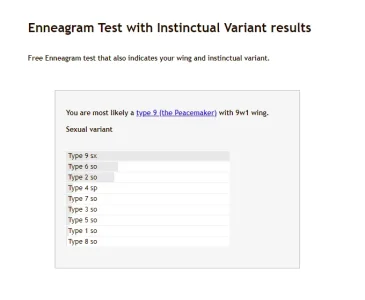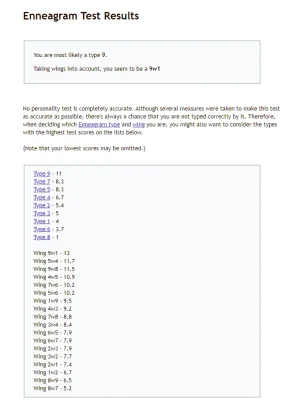You are using an out of date browser. It may not display this or other websites correctly.
You should upgrade or use an alternative browser.
You should upgrade or use an alternative browser.
Post your Enneagram
- Thread starter Satya
- Start date
More options
Who Replied?- MBTI
- INFJ
- Enneagram
- 954 so/sx
You used a monkey! We are friends now.
D
Deleted member 16771
Hi @Rowan Tree,
Yeah I keep getting 1w2, it's interesting that you do, too, considering our outlook on politics in life.
It's actually reassuring that you get this, too, since I thought 'well, am I doing the wrong thing, then? Should I be some kind of activist?', whereas we both enjoy more cerebral activities and interests.
I really do think that what the enneagram picks up is something like a moral stance, especially in relation to conflict, so while we may be comfortable daydreaming and thinking about ideas in times of 'peace', we are 'activated' so to speak when there is injustice to consider.
So when I was a teacher - even though I loved my subject and teaching it to children - I was irresistibly pulled into Union activities and negotiations with the head. Did I 'want' to be a union leader? No. But the injustice of the situation possessed me.
So I wonder how the personality of 1s manifests when there is no injustice in their immediate circumstances, and how this personality comes out in terms of intellectual thinking, art and passion projects, &c.
What do you reckon?
Yeah I keep getting 1w2, it's interesting that you do, too, considering our outlook on politics in life.
It's actually reassuring that you get this, too, since I thought 'well, am I doing the wrong thing, then? Should I be some kind of activist?', whereas we both enjoy more cerebral activities and interests.
I really do think that what the enneagram picks up is something like a moral stance, especially in relation to conflict, so while we may be comfortable daydreaming and thinking about ideas in times of 'peace', we are 'activated' so to speak when there is injustice to consider.
So when I was a teacher - even though I loved my subject and teaching it to children - I was irresistibly pulled into Union activities and negotiations with the head. Did I 'want' to be a union leader? No. But the injustice of the situation possessed me.
So I wonder how the personality of 1s manifests when there is no injustice in their immediate circumstances, and how this personality comes out in terms of intellectual thinking, art and passion projects, &c.
What do you reckon?
Rowan Tree
Community Member
What do you reckon?
I can relate to everything you said, especially in terms of regarding politics more as a moral obligation than subjective preference. I should preface by admitting to still struggling with the enneagram—I find it less intuitive than MBTI, which perhaps reflects the fact that it encompasses vaguer, more value-based aspects of personality. Nonetheless, another way 1w2 might come out for me is how I enjoy working through and debating subjective, only semi-graspable ideas.
I have an INFJ (likely 1w9) friend (who types much more easily, not being on the spectrum) and since we were teenagers we enjoyed long, elliptical conversations that wedded quite abstract ideas to moral and empirical observation in tangents that would often fold in on themselves. Whereas with other types this kind of talk is rarer and harder to sustain; such as my ENFP (at a guess) childhood friend, whose enneagram I'm unsure about, with whom I connect on more creative projects and aesthetic enjoyments, sharing essential moral convictions that aren't really discussed.
So I wonder how the personality of 1s manifests when there is no injustice in their immediate circumstances, and how this personality comes out in terms of intellectual thinking, art and passion projects, &c.
As a utopian, I ask this question often. And I go back to my early childhood experiences, which were good, in which I would construct elaborate, narrative-based games for my siblings and our friends. And I believe we were very much working out the world, often at a quite sophisticated level. I can imagine INFJ 1w2s using utopia to enjoy a more relaxed, playful cultivation not only of the self, but of other selves, through imaginative activities that marry the abstract (Ni) with concrete values (Fe).
It's interesting to me that you have chosen a pedagogical vocation. Education fascinates me and I often see my freelance editing as having a pedagogical (and even therapeutic) dimension. Phenomenologically, injustice presents itself as a demand, but in lieu of that, a purer moral cultivation takes over and it is analogous to aesthetic pursuits (Plato made much of the interrelationship of truth, beauty and goodness). In that, it is an incommensurable and even, perhaps, ludic praxis that is open-ended and pluralistic. I guess what this comes back to, over and over, is that injustice must take precedence, but my preference is for a type of serious (even morally serious) play—into which category I would put my writing, editing and reading.
Impact Character
folding paper cranes ⭐
- MBTI
- inconcrete
- Enneagram
- 964
*gets gently pushed into the conversation*
….
Here is a spark for you..
*** or other worlds that mix from these categories:
Location/Culture: ours, foreign, alien
Time: historian, present, near future, sci-fi
Reality: realistic/non-fantasy, fantastic, low fantasy/hard sci-fi, high fantasy/soft sci-fi
Theme: bright/optimistic/utopic, dark/pessimistic/dystopic.. but also themes like journey, mission, horror and so on (genres for example)
Spark:
there are different levels to ones role in this
….
(... .. ..now I do alot roleplay theory..."playing" as an enforcing element of the learning process..with an eye on rather non-reality but virtual or fictional experiences....and the central meaning of fun that adults often seem to learn and forget...)
….
As a utopian, I ask this question often. And I go back to my early childhood experiences, which were good, in which I would construct elaborate, narrative-based games for my siblings and our friends. And I believe we were very much working out the world, often at a quite sophisticated level.
I can imagine INFJ 1w2s using utopia to enjoy a more relaxed, playful cultivation not only of the self, but of other selves, through imaginative activities that marry the abstract (Ni) with concrete values (Fe).
Here is a spark for you..
***using utopia
to enjoy a more relaxed, playful cultivation not only of the self, but of other selves, through imaginative activities that marry the abstract (Ni) with concrete values (Fe).
*** or other worlds that mix from these categories:
Location/Culture: ours, foreign, alien
Time: historian, present, near future, sci-fi
Reality: realistic/non-fantasy, fantastic, low fantasy/hard sci-fi, high fantasy/soft sci-fi
Theme: bright/optimistic/utopic, dark/pessimistic/dystopic.. but also themes like journey, mission, horror and so on (genres for example)
Spark:
there are different levels to ones role in this
- the playing "me" on a meta level > "you and me playing right now and a tuesday 3pm in the living room" (realtime-real-out out game-"me" playing)
- the playing "me" that isn't very reflective but who is simulating him/herself (in another world/time/reality/theme)
- the playing "me" that is playing her/himself incorporating a wishful alteration
- the playing "me" that is simulating "someone else" (fictional/nonfictional) but who is still incorporated him/herself as the interpreting entity of that role (walk in someone elses shoes or even mirroring/method acting)
….
(... .. ..now I do alot roleplay theory..."playing" as an enforcing element of the learning process..with an eye on rather non-reality but virtual or fictional experiences....and the central meaning of fun that adults often seem to learn and forget...)
Rowan Tree
Community Member
*gets gently pushed into the conversation*

Location/Culture: ours, foreign, alien
Time: historian, present, near future, sci-fi
Reality: realistic/non-fantasy, fantastic, low fantasy/hard sci-fi, high fantasy/soft sci-fi
Theme: bright/optimistic/utopic, dark/pessimistic/dystopic.. but also themes like journey, mission, horror and so on (genres for example)
I definitely want to use some of this as a prompt. I also like relating the other genres to utopia-dystopia axis in new ways. For example, I have described a friend's work as utopian-horror—Clive Barker is essentially almost always a uoptian horror author.
Spark:
there are different levels to ones role in this
- the playing "me" on a meta level > "you and me playing right now and a tuesday 3pm in the living room" (realtime-real-out out game-"me" playing)
- the playing "me" that isn't very reflective but who is simulating him/herself (in another world/time/reality/theme)
- the playing "me" that is playing her/himself incorporating a wishful alteration
- the playing "me" that is simulating "someone else" (fictional/nonfictional) but who is still incorporated him/herself as the interpreting entity of that role (walk in someone elses shoes or even mirroring/method acting)
Agree with all of this.
(... .. ..now I do alot roleplay theory..."playing" as an enforcing element of the learning process..with an eye on rather non-reality but virtual or fictional experiences....and the central meaning of fun that adults often seem to learn and forget...)
This is really interesting, and I especially agree about adults and play.
Impact Character
folding paper cranes ⭐
- MBTI
- inconcrete
- Enneagram
- 964

@Rowan Tree if you think about story as an argument (as I prefer it).. and elements like central conflict .. horror is actually just describing "man vs. evil supernatural" (description of the story conflict ...not the world in itself as in where and when.. .. ..)
I had to explain to many people what dark fantasy really is about imho.. because usually people just go "ah, tolkien in middle ages" oO
Rowan Tree
Community Member
I had to explain to many people what dark fantasy really is about imho.. because usually people just go "ah, tolkien in middle ages" oO
Haha, I know this struggle.
- MBTI
- INFJ
- Enneagram
- 9w1 947
You are most likely a type 4.
Your wings seem to be balanced.
Type 4 - 12.3
Type 9 - 10.3
Type 6 - 9
Type 2 - 7.7
Type 7 - 7
Type 5 - 6
Type 3 - 5.7
Type 1 - 4.7
Type 8 - 1.7
Wing 4w5 - 15.3
Wing 4w3 - 15.2
Wing 9w1 - 12.7
Wing 6w7 - 12.5
Wing 5w4 - 12.2
Wing 6w5 - 12
Wing 3w4 - 11.9
Wing 7w6 - 11.5
Wing 9w8 - 11.2
Wing 2w3 - 10.6
Wing 5w6 - 10.5
Wing 2w1 - 10.1
Wing 1w9 - 9.9
Wing 3w2 - 9.6
Wing 1w2 - 8.6
Wing 7w8 - 7.9
Wing 8w9 - 6.9
Wing 8w7 - 5.2
Your wings seem to be balanced.
Type 4 - 12.3
Type 9 - 10.3
Type 6 - 9
Type 2 - 7.7
Type 7 - 7
Type 5 - 6
Type 3 - 5.7
Type 1 - 4.7
Type 8 - 1.7
Wing 4w5 - 15.3
Wing 4w3 - 15.2
Wing 9w1 - 12.7
Wing 6w7 - 12.5
Wing 5w4 - 12.2
Wing 6w5 - 12
Wing 3w4 - 11.9
Wing 7w6 - 11.5
Wing 9w8 - 11.2
Wing 2w3 - 10.6
Wing 5w6 - 10.5
Wing 2w1 - 10.1
Wing 1w9 - 9.9
Wing 3w2 - 9.6
Wing 1w2 - 8.6
Wing 7w8 - 7.9
Wing 8w9 - 6.9
Wing 8w7 - 5.2
PapillonT
Community Member
- MBTI
- INFJ-T
- Enneagram
- 5w4 sx
You are most likely a type 4.
Taking wings into account, you seem to be a 4w5
Type 4 - 10
Type 1 - 9
Type 5 - 8
Type 2 - 7.1
Type 8 - 6.4
Type 9 - 6
Type 3 - 5.7
Type 6 - 4.4
Type 7 - 4
Wing 4w5 - 14
Wing 5w4 - 13
Wing 4w3 - 12.9
Wing 1w2 - 12.6
Wing 1w9 - 12
Wing 2w1 - 11.6
Wing 3w4 - 10.7
Wing 9w1 - 10.5
Wing 5w6 - 10.2
Wing 2w3 - 10
Wing 8w9 - 9.4
Wing 3w2 - 9.3
Wing 9w8 - 9.2
Wing 6w5 - 8.4
Wing 8w7 - 8.4
Wing 7w8 - 7.2
Wing 6w7 - 6.4
Wing 7w6 - 6.2
Taking wings into account, you seem to be a 4w5
Type 4 - 10
Type 1 - 9
Type 5 - 8
Type 2 - 7.1
Type 8 - 6.4
Type 9 - 6
Type 3 - 5.7
Type 6 - 4.4
Type 7 - 4
Wing 4w5 - 14
Wing 5w4 - 13
Wing 4w3 - 12.9
Wing 1w2 - 12.6
Wing 1w9 - 12
Wing 2w1 - 11.6
Wing 3w4 - 10.7
Wing 9w1 - 10.5
Wing 5w6 - 10.2
Wing 2w3 - 10
Wing 8w9 - 9.4
Wing 3w2 - 9.3
Wing 9w8 - 9.2
Wing 6w5 - 8.4
Wing 8w7 - 8.4
Wing 7w8 - 7.2
Wing 6w7 - 6.4
Wing 7w6 - 6.2
Impact Character
folding paper cranes ⭐
- MBTI
- inconcrete
- Enneagram
- 964
I did take the test again when feeling a little better today:
So it seems like I'm 4 when very depressed and 9 when feeling more neutral.
I noticed something generally similar as this as well, like.. ^^
Enneagram tests mirror your momentary state of mind in perceiving and judging oneself..or something like that (which could go well with tritype but also with the dissolving/stress arrow of each).
- MBTI
- INFJ
- Enneagram
- 9w1 947
I noticed something generally similar as this as well, like.. ^^
Enneagram tests mirror your momentary state of mind in perceiving and judging oneself..or something like that (which could go well with tritype but also with the dissolving/stress arrow of each).
Oh, yes. Tests only mirror the current state of mind, I know. ^-^ Tests shouldn't be fully trusted when trying to find your type, I think..
I've been just wondering for a while if I've always thought of being enneagram 4 because of depression (how it changes the way you see yourself, more negatively etc.) and even when reading the descriptions of those different enneagram types, 4 just spoke to me the most before because I'm depressed? I don't know if that makes any sense, lol..
Impact Character
folding paper cranes ⭐
- MBTI
- inconcrete
- Enneagram
- 964
Oh, yes. Tests only mirror the current state of mind, I know. ^-^ Tests shouldn't be fully trusted when trying to find your type, I think..
I've been just wondering for a while if I've always thought of being enneagram 4 because of depression (how it changes the way you see yourself, more negatively etc.) and even when reading the descriptions of those different enneagram types, 4 just spoke to me the most before because I'm depressed? I don't know if that makes any sense, lol..
Have you looked up the childhood messages of the enneagram types? Maybe you can find some more clues to unriddle your depression going further with your approach and thinking here..



